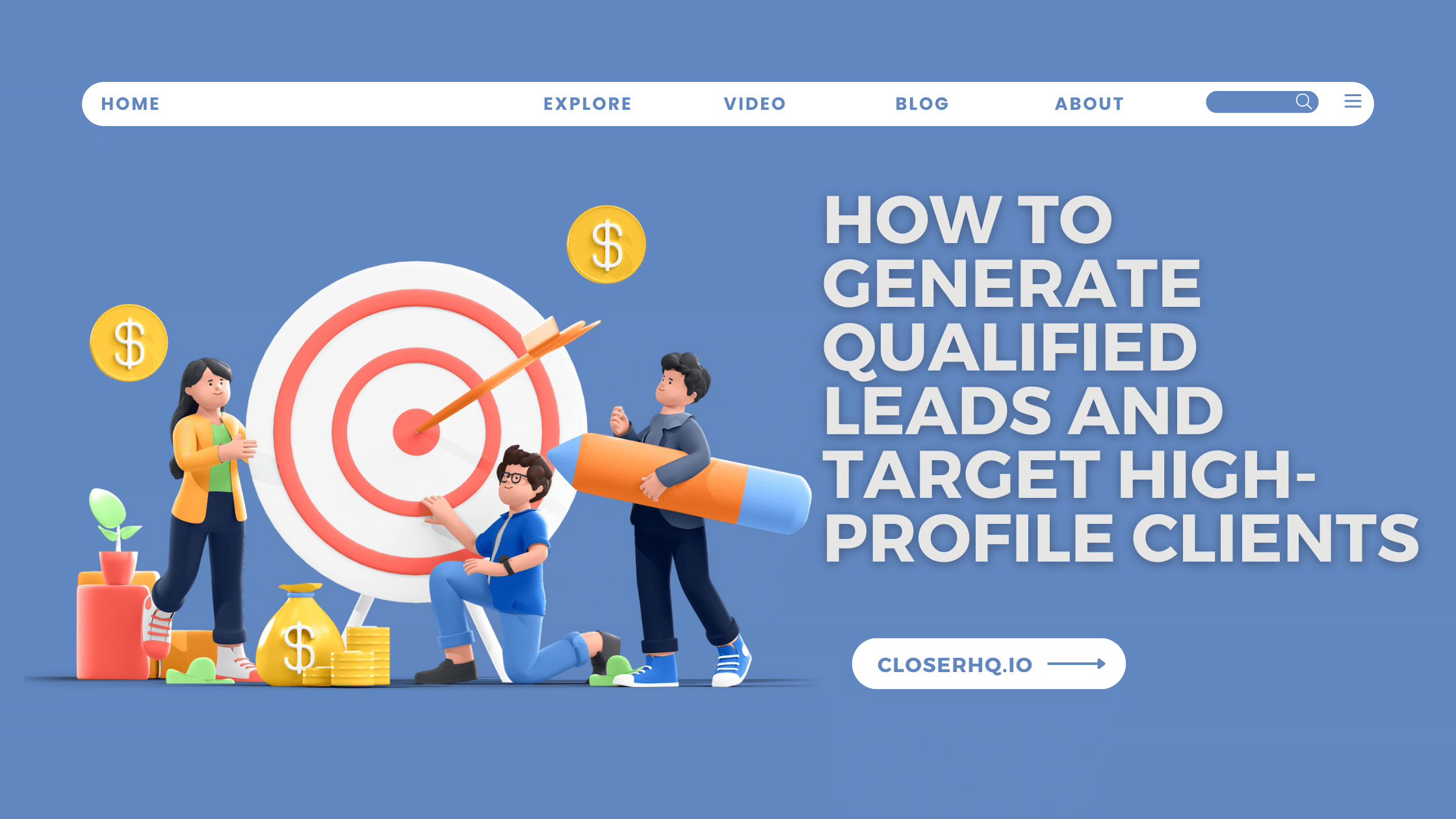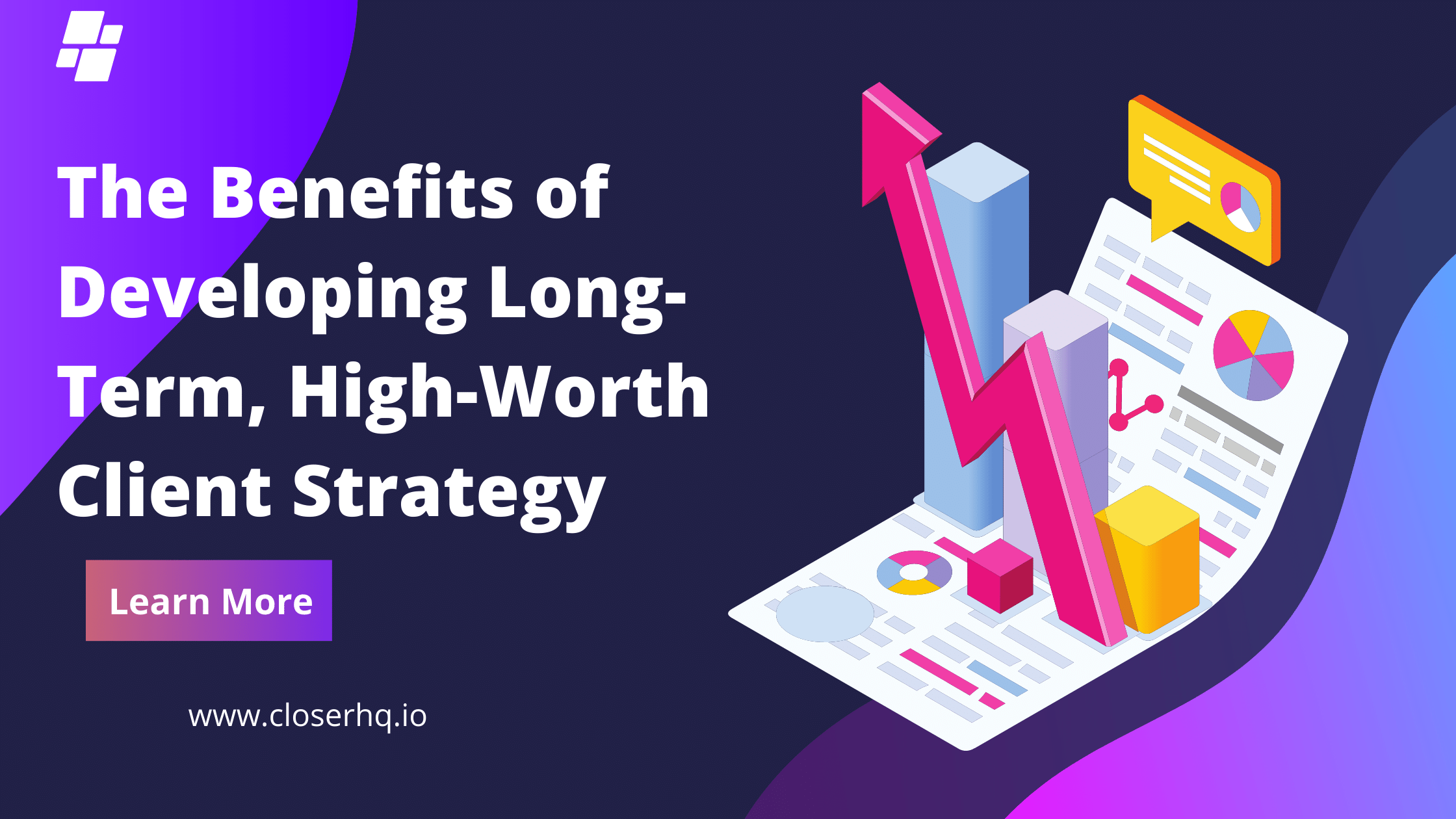Are you struggling to get qualified leads and target high-worth clients in your sales process? If so, you're not alone. Many salespeople struggle with this. However, there are some things you can do to improve your chances of success. Remember, it is not just about getting leads but about generating qualified leads. These are high-worth clients who are most likely to buy your products or services. By definition, high-worth clients are those who bring a great deal of value to your business in terms of both their spending power and their potential for referrals.
Part 1: Identify Your Major Obstacles in Generating Quality Leads for Your Offers
B2B Lead generation is one of the most important aspects of any big business. It is the process of creating interest in one's product or service, and it can be done in many different ways. If you are looking to generate leads for your company, there are a few obstacles that you will need to overcome.
One obstacle you may face as a small business owner is not having enough time to devote to lead generation. If you dedicate an inappropriate amount of time to lead generation, you may end up with low-quality leads who have little or no interest in your product or offer. This can be solved by outsourcing lead generation tasks to an outside agency or partner who specializes in generating high-quality leads for businesses like yours.
Another obstacle would be not having the budget for marketing and advertising campaigns, which can also be solved by hiring an agency or partner that has experience with these types of services. Sometimes you may establish a barter relationship with these partners where you use each other's services and avoid spending. There are several ways to generate marketing revenue for young startups. One involves selling enticing lifetime deals on specialized websites such as AppSumo.
Lastly, some businesses may have great products but don't know how to get their name out there, which can also be solved by making strategic partnerships with other companies with similar offerings. Sometimes you may get into a barter partnership with some businesses or entities who help put the word out about your offer in return for a service quota or a similar favor.
Part II: How to Get Qualified Leads and Target High-Worth Clients in Your Sales Process?
The key to getting qualified leads is to identify the needs of your target audience and then customize your message accordingly. This will help you get more responses from interested prospects and ensure they are not wasting their time with you. Following this, you can continue to nurture your leads until they make a purchase. Below, we will examine some of the most successful step-by-step sales tips for sales teams to obtain qualified and high-worth leads that can improve their sales potential.

1. Define Your Buyer Personas (Target Audience)
When you’re running a business, it’s important to take the time to define your ideal customer. This process will help you to get qualified leads and target high-worth clients in your sales process. By taking the time to understand personal information about your ideal customer, you can better tailor your sales pitch, products, or services to meet their needs and appeal to them directly. Moreso, you’ll be able to save time and money by targeting your marketing efforts towards those most likely to use your products or services.
When defining your ideal customer, there are a few key questions you should ask yourself.
- First, what problem does your product or service solve? Your ideal customer should have a need for your product or service.
- Secondly, what are the demographics of your ideal customer? This includes factors such as age, gender, location, income, and occupation. Knowing your ideal customer demographics will help you better target your marketing efforts.
- Finally, what are your ideal customer's interests? What are they looking for in a product or service? What kind of language do they respond to? Knowing this will help you create marketing messages that resonate with them.
- Lastly, consider what they need and want, and what will make them loyal, satisfied customers. What are the interests and hobbies of your ideal customer? Knowing what your ideal customer like to do in their free time can help you create marketing materials that appeal to them.
2. Research Your Target Market and Prospects
Research is key when trying to get qualified leads and target high-worth clients. You need to understand your target market and what they're looking for so that you can adjust your sales process accordingly. There are a few ways to go about this research. First, you can use online tools and resources to get an idea of your target market and what they're interested in. You can also talk to people in your industry and get their insights. Finally, you can reach out to your target market directly and ask them questions.
When you have a good understanding of your target market, you can start to identify high-worth clients and what needs or pain points they have that your product or service can address. These are the clients who could bring significant value to your business. To find high-worth clients, consider using market research and data analysis to identify patterns and trends. This can help you identify the clients most likely to need your product or service and who could be interested in doing business with you. This can be done through various channels, such as online research, advertising, direct mail, networking, referrals or even personal visits. Once you've identified high-worth clients, reach out to them and start building relationships.
Make sure that you are constantly updating your knowledge of your target market. This way, you can adapt your sales strategy as the market changes. By taking the time to research your target market, you can ensure that you are always one step ahead of your competition.
3. Create a Compelling Offer
The most successful businesses understand that compelling offers are key to maximizing sales potential. This means offering something irresistible to your target market that provides real value. It could be a discount, a free trial, or something else entirely. The important thing is to make sure that your offer is truly compelling to maximize your conversion rate.

Here are some tips for creating a compelling offer:
- Start by identifying your target audience. Who are your ideal customers? What do they need or want? What are their pain points?
- Once you know your target audience, you can create an offer that resonates with them and is tailored to their needs. Your offer should be something that they need or want, and it should address their pain points.
- Make sure your offer is clear and easy to understand. The last thing you want is for your customers to be confused about what they're getting. Make sure to include all the relevant details and highlight the benefits of your offer.
4. Develop a Sales and Marketing Strategy
To maximize your chances of getting qualified leads and targeting high-worth clients, it is important to develop a sales strategy that considers your business's specific needs. This means understanding your target market and understanding what motivates them to make a purchase. It also means having a well-defined sales process that you can use to build relationships with clients and close deals.
It is important to have a system in place to track your progress and measure your success. By taking these steps, you can ensure that you are making the most of your sales efforts by maximizing the strategies that are producing the best results.
Develop a sales strategy to maximize your return on investment by targeting high-worth clients and qualified leads. By focusing your sales efforts on these more lucrative opportunities, you can increase your overall sales and improve your bottom line.
When developing your sales strategy, there are a few key things to keep in mind:
- Who is your target audience?
- What needs or pain points does your product or service address?
- How will you reach your target audience?
- What are your sales goals?
- What resources do you have available to help you reach your sales goals?
Whatever approach you take, it's important to have a well-defined sales strategy in place to make the most of your time and resources. By targeting the right clients and leads, you can avoid wasting time on dead-end prospects and rather focus your efforts on making sales rather than trying to sell to anyone who will listen. Your sales strategy should be tailored to your specific products or services and your goals for growth. With a well-defined sales strategy in place, you can maximize your chances for success and reach your business goals.
5. Train Your Sales and Marketing Teams
As the old saying goes, "You can't sell without leads." But what good are leads if they're not qualified? As a business owner, you know that sales are the lifeblood of your company. Without a strong sales team, it would be difficult to keep your business afloat. That's why it's important to train your sales team and equip them with the skills and knowledge necessary to be successful, maximize their potential, and focus on getting qualified leads and targeting high-worth clients.

There are a few key things that you can do to help your marketing and sales team reach their full potential.
- First, you need to ensure that they clearly understand your company's products and services. They should be able to articulate this information in a clear and concise way.
- Secondly, you need to provide them with the tools and resources they need to be successful. This includes access to a reliable internet connection, a quiet workplace, and any software or hardware they need.
For the sales team, you must:
- Research your leads thoroughly. Know their needs, wants, and pain points. The more you know about them, the better equipped you'll be to sell to them.
- Go above and beyond with your service. Provide them with value that they can't find anywhere else.
- Be persistent but not pushy. Follow up regularly, but don't be intrusive.
6. Create a Lead Generation Strategy
When it comes to sales, generating leads is essential to success. After all, without leads, there would be no one to sell to! However, simply having leads isn’t enough – you need qualified leads that are interested in what you’re selling. And not only that, but you need to target high-worth clients that will generate the most revenue for your business. So how can you create a lead generation strategy to help you achieve all of this?
There are a variety of ways that you can generate leads.
- One way is to buy leads from a reputable lead generation software or company. This can be a quick and easy way to get leads, as there are many lead generation tools in today's market, but it can be expensive.
- Another way to generate leads is to create a lead magnet, such as an ebook or a course, and offer it for free in exchange for the visitor's contact information. This can be done by creating a website or landing page that offers a freebie in exchange for the visitor's email, for example. You can also generate leads by running ads in newspapers or online or email campaigns (e.g., sending cold emails).
- You can also generate leads by writing articles and blog posts that are relevant to your target market and including a call to action to sign up for your email list.
- You can also run paid ads, such as LinkedIn ads or social media ads, to generate leads and drive traffic to your site.
7. Engage, Nurture and Convert Your Leads

Use multiple channels to reach your leads. If you're not engaging your leads and nurturing them through the sales process, you're missing out on a huge opportunity to increase your sales. By engaging your leads and nurturing them, you're increasing their chances of becoming qualified leads and high-worth clients. By doing this, you're maximizing your sales potential and making the most out of your leads.
8. Evaluate and Adjust Your Sales Approach
As a sales professional, it's important to constantly evaluate and adjust your sales approach in order to maximize your sales potential. This may involve changing how you communicate with prospects, the type of content you share, and the nature of your offers. By assessing your current sales methods and making necessary changes, you can ensure that you're making the most of your time and resources.
One way to evaluate your sales approach is to track your success rate in converting leads into clients. If you realize that you're not converting as many leads as you'd like, it may be time to reconsider your sales strategy. Another important factor to consider is the average value of your clients. If you're targeting high-worth clients, you may need to adjust your sales approach to meet their needs better. By doing so, you'll be able to stay ahead of the competition and close more sales.
Part III: The Benefits of Developing a Long-Term, High-Worth Client Strategy
When it comes to business, the old adage "The customer is always right" still holds. This means that if you want to stay in business and be successful, you need to keep your customers happy. One of the best ways to do this is to develop a long-term, high-worth client strategy.

High-worth clients are the best set of clients any business dreams of--because they bring in the greatest value. They are also typically more loyal and easier to work with than lower-value clients. As such, developing a long-term strategy for working with high-worth clients can bring several benefits to your business, including:
- You'll deepen your relationship with your clients.
- You'll better understand their needs and how to meet them.
- You'll develop a reputation for being a reliable and trustworthy business.
- Your clients will be more likely to refer you to others.
- You'll create greater customer loyalty by establishing a well-known solid client fan base.
- Increased revenue: High-worth clients tend to spend more money and do so more regularly than lower-value clients. As such, developing a long-term relationship with them can lead to a significant increase in revenue for your business, which is the ultimate goal.
Conclusion :
In summary, I define a qualified lead as someone who has a need you can solve. Once you've identified that, you can refine the prospect list by refining your own qualification criteria. This way, you're not wasting time pitching your solution to people who aren't ready to buy.
There are many ways to go about targeting high-worth clients and qualified leads. One approach we have seen repeatedly mentioned in many strategies and tips is to identify your ideal customer profile and then focus your sales and marketing efforts on reaching these individuals. This helps your team increase customer conversion rate. Another approach is to use lead scoring to prioritize your prospects in the sales funnel, target those most likely to convert into paying customers, engage, nurture and convert them, etc.
Always remember, the best salespeople don't just sell - they create value, then they create relationships and partnerships with their clients. They understand their client's needs and develop strategies to help them achieve those goals. And they know when it's time to ask for the sale.
